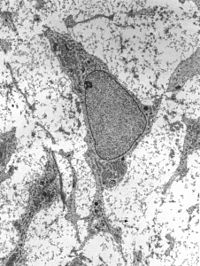
Photo from wikipedia
Human mesenchymal stem cells (hMSCs) are the cornerstone of regenerative medicine; large quantities of hMSCs are required via in vitro expansion to meet therapeutic purposes. However, hMSCs quickly lose their… Click to show full abstract
Human mesenchymal stem cells (hMSCs) are the cornerstone of regenerative medicine; large quantities of hMSCs are required via in vitro expansion to meet therapeutic purposes. However, hMSCs quickly lose their osteogenic differentiation potential during in vitro expansion, which is a major roadblock to their clinical applications. In this study, we found that the osteogenic differentiation potential of human bone marrow stem cells (hBMSCs), dental pulp stem cells (hDPSCs), and adipose stem cells (hASCs) was severely impaired after in vitro expansion. To clarify the molecular mechanism underlying this in vitro expansion-related loss of osteogenic capacity in hMSCs, the transcriptome changes following in vitro expansion of these hMSCs were compared. Cysteine-rich secretory protein LCCL domain-containing 2 (CRISPLD2) was identified as the most downregulated gene shared by late passage hBMSCs, hDPSCs, and hASCs. Both the secreted and non-secreted CRISPLD2 proteins progressively declined in hMSCs during in vitro expansion when the cells gradually lost their osteogenic potential. We thus hypothesized that the expression of CRISPLD2 is critical for hMSCs to maintain their osteogenic differentiation potential during in vitro expansion. Our studies showed that the knockdown of CRISPLD2 in early passage hBMSCs inhibited the cells' osteogenic differentiation in a siRNA dose-dependent manner. Transcriptome analysis and immunoblotting indicated that the CRISPLD2 knockdown-induced osteogenesis suppression might be attributed to the downregulation of matrix metallopeptidase 1 (MMP1) and forkhead box Q1 (FOXQ1). Furthermore, adeno-associated virus (AAV)-mediated CRISPLD2 overexpression could somewhat rescue the impaired osteogenic differentiation of hBMSCs during in vitro expansion. These results revealed that the downregulation of CRISPLD2 contributes to the impaired osteogenic differentiation of hMSCs during in vitro expansion. Our findings shed light on understanding the loss of osteogenic differentiation in hMSCs and provide a potential therapeutic target gene for bone-related diseases.
Journal Title: Journal of cellular physiology
Year Published: 2023
Link to full text (if available)
Share on Social Media: Sign Up to like & get
recommendations!